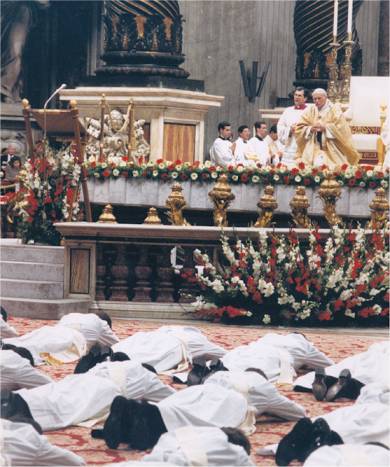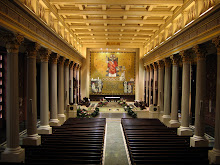Fr. Toups, author of the forthcoming Reclaiming Our Priestly Character, has an interview posted at Zenit. Thanks to Rich for the email.
Q: Your book focuses on recovering what you call the “doctrine of the priestly character.” Can you describe this “doctrine” in a nutshell?
Father Toups: The “doctrine of the priestly character” is about the permanent relationship the priest enters into with Christ the High Priest on the day of his ordination. The priest is always a priest; he is not a simple functionary who performs ritual actions, but rather he is configured to Christ in the depths of his being by what is called an ontological change. Christ is working through him at the altar, “This is my Body,” and in the confessional, “I absolve you of your sins,” but also in his daily actions outside the sanctuary. The character that the priest receives is a comfort to the faithful inasmuch as they realize that their faith is not based in the personality of the priest, but rather the Person of Christ working through the priest. On the other hand, the priest is called, like all of the faithful, to a life of holiness. The character received at ordination is actually a dynamism for priestly holiness. The more he can assimilate his life to Christ and submit to the gift he received at ordination, the more he will be a credible witness to the faithful and edify the Body of Christ.
Q: Is it your view that the nature of the priesthood is unknown or misunderstood by many priests? Is mandatory “continuing priestly education” the answer?
Father Toups: Studies show that there has been confusion regarding the exact nature of the priesthood among priests themselves depending on the timing of their seminary training.Immediately following the Second Vatican Council, there was confusion among priests and laity alike about the difference between the priesthood of the faithful and the ministerial priesthood. Vatican II’s intention was not to suppress one in order to highlight the other, but rather to recognize the universal call to holiness and the dignity of both. The ministerial priesthood is a specific vocation within the Church in which a man is called by Christ in the apostolic line to offer the Holy Sacrifice of the Mass. Priests are different by virtue of ordination, as confirmed by the council itself in paragraph 10 of “Lumen Gentium,” which emphasized that the baptized and the ordained share in the one and the same priesthood of Christ, but in a way that differs “in essence and not only in degree.” This difference certainly does not mean better or even holier -- that would be a major error -- but it does mean that there is a distinction. Cardinal Avery Dulles points out that, if anything, the priesthood of the faithful is more exalted because the ministerial priesthood is ordered to its service. Hence, a recovery from the confusion lies in the need to understand the balance a priest is to find; he is both a servant and one who has been set aside by Christ and the Church to stand "in persona Christi" -- not as a personal honor, but as “one who has come to serve and not be served.” The priest need not be embarrassed about this high calling, but should boldly live it out in the midst of the world. Pope John Paul the Great regularly reminded priests: “Do not be afraid to be who you are!”This brings us to the second part of your question, namely, is mandatory “continuing priestly education” the answer? In the book, I use the term “formation,” not education -- though learning is an important, component part. Ongoing formation is essential for every Christian vocation. In the midst of full liturgical schedules, parish councils, leaking roofs and hospital visits, the priest must continually open his heart and mind to Christ in prayer and study, annual retreats and seminars, as well as times of recreation and vacation, if he is to thrive as an individual and as a man of faith. Ongoing formation is about deepening one’s interiority and fostering a relationship with Jesus Christ. It is about an ongoing conversion that reminds the priest who he is as a minister of the Gospel and whose he is as a son of God. So is ongoing formation the answer? It is certainly a part of the solution to a happier, healthier presbyterate. Pope John Paul II wrote, “Ongoing formation helps the priest to be and act as a priest in the spirit and style of Jesus the Good Shepherd” ("Pastores Dabo Vobis," 73).
Subscribe to:
Post Comments (Atom)










No comments:
Post a Comment